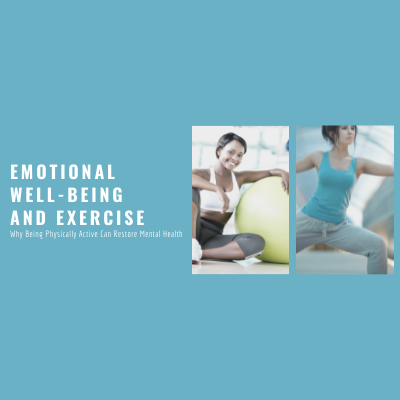We hear all the time that increasing physical activity can significantly improve our mental health… and we’re not here to disagree! However, this month we’re discussing why it’s more important to incorporate planned exercise into your daily routine and evaluate how your emotional well-being transforms when you become increasingly active.
PLUS! Why not take the lessons we learn in the gym back into our daily routine? Building strength and resilience in our body in turn can foster these same characteristics in our approaches to tasks at home and work.
First, the difference between non-exercise activity thermogenesis (NEAT) physical activity and exercise is a critical element of the information we plan on sharing. We’ll let the National Academy of Sports Medicine (NASM) explain what NEAT physical activity is, but we will elaborate on planned exercise and its benefit on emotional well-being.
Second, mental health and emotional well-being are interconnected and constantly in flux. If at any point, your emotional state affects your day-to-day function and you experience any of these symptoms (kindly explained by the Substance Abuse and Mental Health Services Administration), it is crucial you seek professional help. A mental health professional will be better able to help you manage your emotions.
Finally! We are ready to evaluate, educate, and engage you in your own physical and emotional wellness journey. Changes don’t happen overnight, but with guidance and consistency you will find that it’s easier to get started and continue making healthy choices. When we say that consistency is key, we mean it– healthy habits turn into lifestyle changes and long-term lifestyle change is where we discover optimal well-being.
Cardiovascular Exercise
Cardio includes more than just running– it is doing any moderate to vigorous activity that elevates the heart and breathing rates, strengthening the heart and lungs. It is also just one type of exercise; there is strength, balance, and flexibility training that we will highlight later on. Cardiovascular exercise conveniently offers benefits that affect the whole body, but especially the mind! See below:
- increases the “feel good” hormones – endorphins, serotonin, dopamine, and oxytocin are the most commonly discussed. While we could dive into the chemical relationships they have with our bodies, it is more important to know that more cardio means more of these hormones! Encouraging regulation of our feelings, moods, and stress levels. Think “runner’s high” without the running!
AND
- improves the quality and rhythm of sleep – when you expend energy, it is easier to fall asleep at night– partly because a quieter mind means less pre-sleep anxiety and less energy means you are more tired! Furthermore, if you exercise outside, your body is more likely to follow the circadian change of light from day to night. When night arrives, you feel the pressure to rest!
Combine increased exercise, “feel good” hormones, and a regular sleep routine, and what do you get? A stronger body, steady emotions, and proper recovery. These factors can lead to a healthier emotional well-being.
We understand that your well-being may have taken a back seat during the pandemic, but it is time to prioritize your mind and body and take back your health! While the American Heart Association recommends 150 minutes of moderate to vigorous exercise each week, it is likely that, if you became more sedentary during the last couple years, this goal may seem unattainable. Part of setting a SMART goal is ensuring your goal is achievable. How do you start?
- Carve out one 10-minute window during your work day to walk. Or if you have a work phone call, take a walk while you talk!
- If safe to do so, park at the back of the parking lot at work, grocery store, post office, restaurant, etc.
- Take the stairs when you have the option to choose between them and an elevator.
- Unconventional cardio counts! Dance with your kids. Walk more with your dog. Take your cat on a hike. Bike to the nearest grocery store to buy ingredients for dinner. There is value in short, unplanned activity as well!


